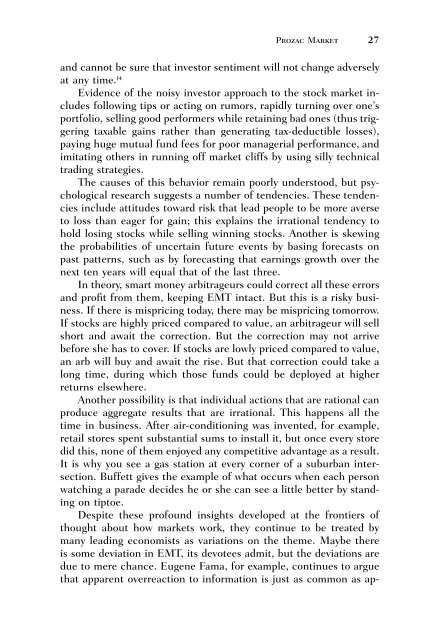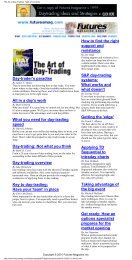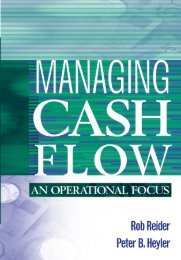HOW TO THINK LIKE BENJAMIN GRAHAM AND INVEST LIKE WARREN BUFFETT
How to Think Like Benjamin Graham and Invest Like Warren Buffett
How to Think Like Benjamin Graham and Invest Like Warren Buffett
- No tags were found...
Create successful ePaper yourself
Turn your PDF publications into a flip-book with our unique Google optimized e-Paper software.
Prozac Market 27<br />
and cannot be sure that investor sentiment will not change adversely<br />
at any time. 14<br />
Evidence of the noisy investor approach to the stockmarket includes<br />
following tips or acting on rumors, rapidly turning over one’s<br />
portfolio, selling good performers while retaining bad ones (thus triggering<br />
taxable gains rather than generating tax-deductible losses),<br />
paying huge mutual fund fees for poor managerial performance, and<br />
imitating others in running off market cliffs by using silly technical<br />
trading strategies.<br />
The causes of this behavior remain poorly understood, but psychological<br />
research suggests a number of tendencies. These tendencies<br />
include attitudes toward riskthat lead people to be more averse<br />
to loss than eager for gain; this explains the irrational tendency to<br />
hold losing stocks while selling winning stocks. Another is skewing<br />
the probabilities of uncertain future events by basing forecasts on<br />
past patterns, such as by forecasting that earnings growth over the<br />
next ten years will equal that of the last three.<br />
In theory, smart money arbitrageurs could correct all these errors<br />
and profit from them, keeping EMT intact. But this is a risky business.<br />
If there is mispricing today, there may be mispricing tomorrow.<br />
If stocks are highly priced compared to value, an arbitrageur will sell<br />
short and await the correction. But the correction may not arrive<br />
before she has to cover. If stocks are lowly priced compared to value,<br />
an arb will buy and await the rise. But that correction could take a<br />
long time, during which those funds could be deployed at higher<br />
returns elsewhere.<br />
Another possibility is that individual actions that are rational can<br />
produce aggregate results that are irrational. This happens all the<br />
time in business. After air-conditioning was invented, for example,<br />
retail stores spent substantial sums to install it, but once every store<br />
did this, none of them enjoyed any competitive advantage as a result.<br />
It is why you see a gas station at every corner of a suburban intersection.<br />
Buffett gives the example of what occurs when each person<br />
watching a parade decides he or she can see a little better by standing<br />
on tiptoe.<br />
Despite these profound insights developed at the frontiers of<br />
thought about how markets work, they continue to be treated by<br />
many leading economists as variations on the theme. Maybe there<br />
is some deviation in EMT, its devotees admit, but the deviations are<br />
due to mere chance. Eugene Fama, for example, continues to argue<br />
that apparent overreaction to information is just as common as ap-




